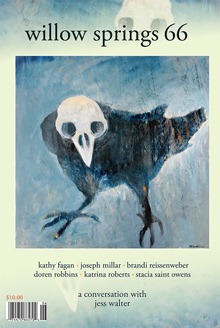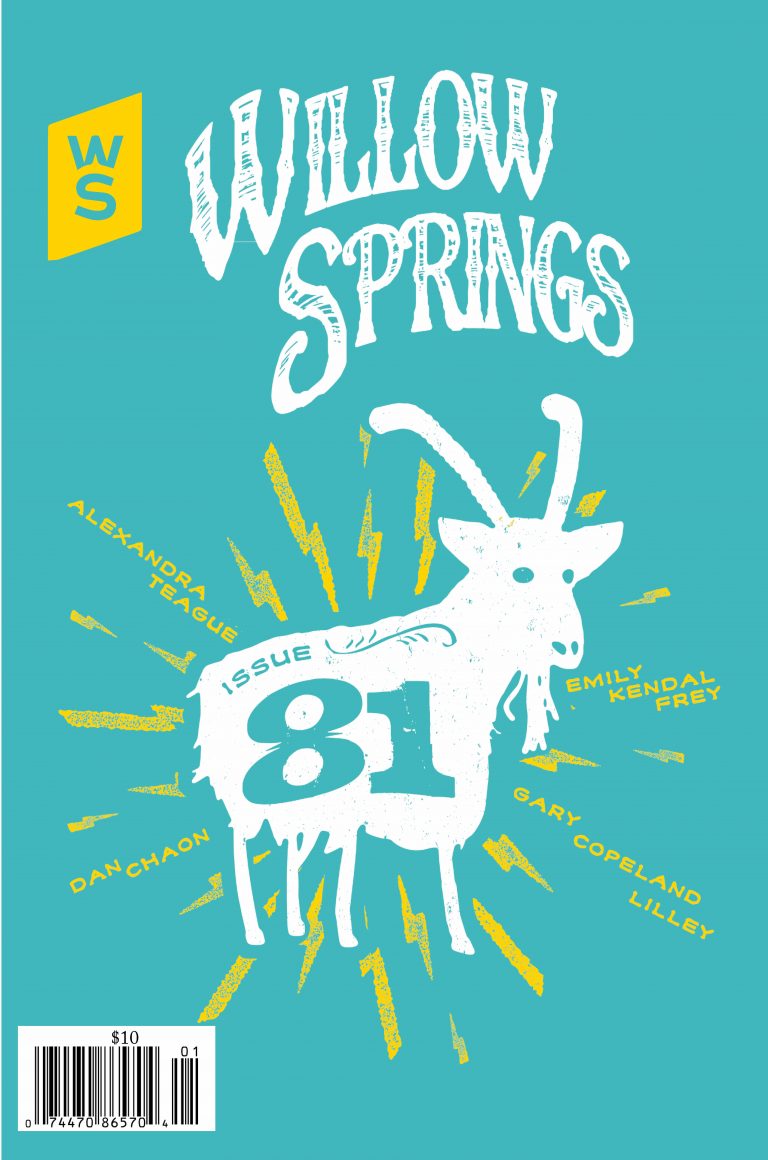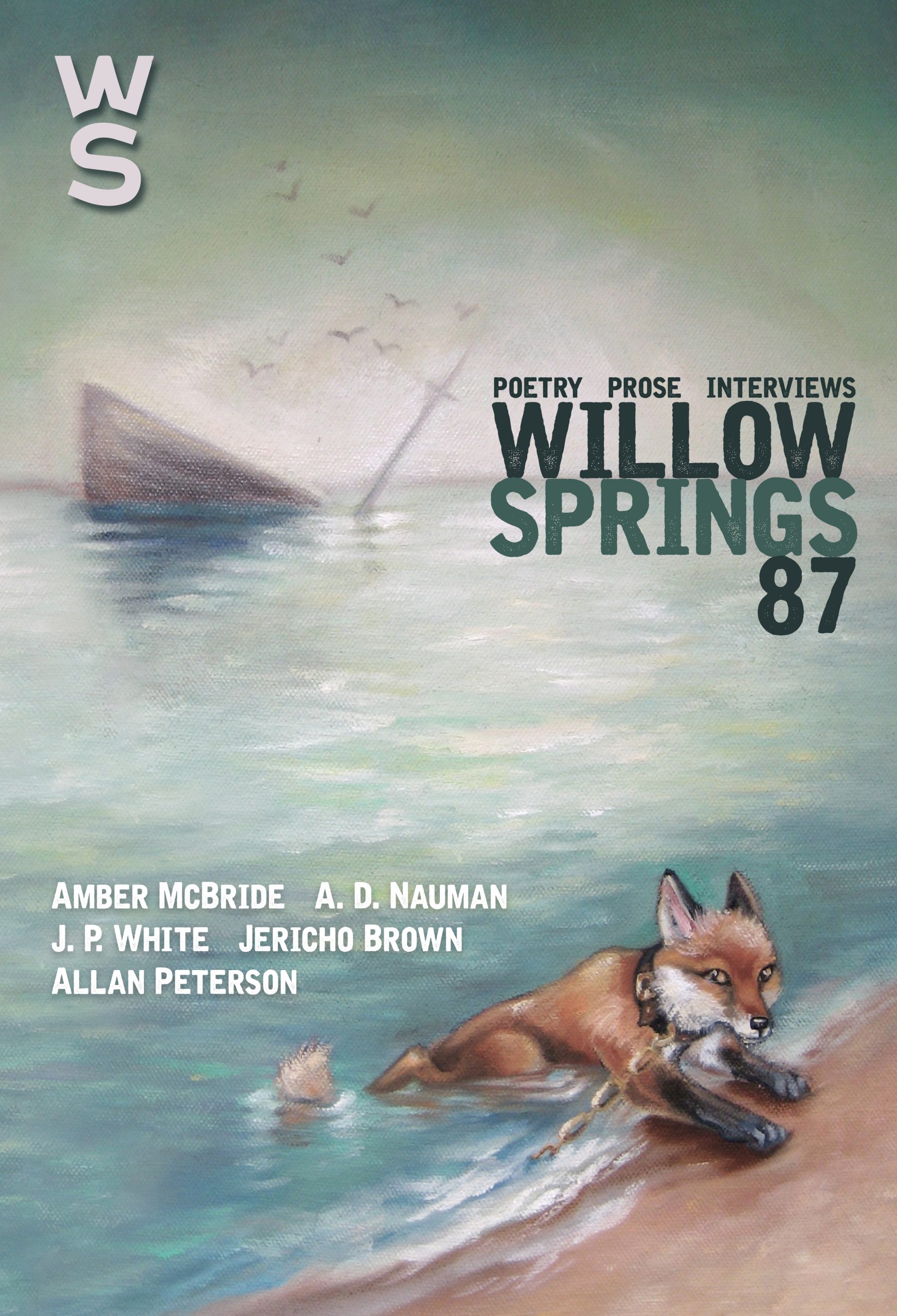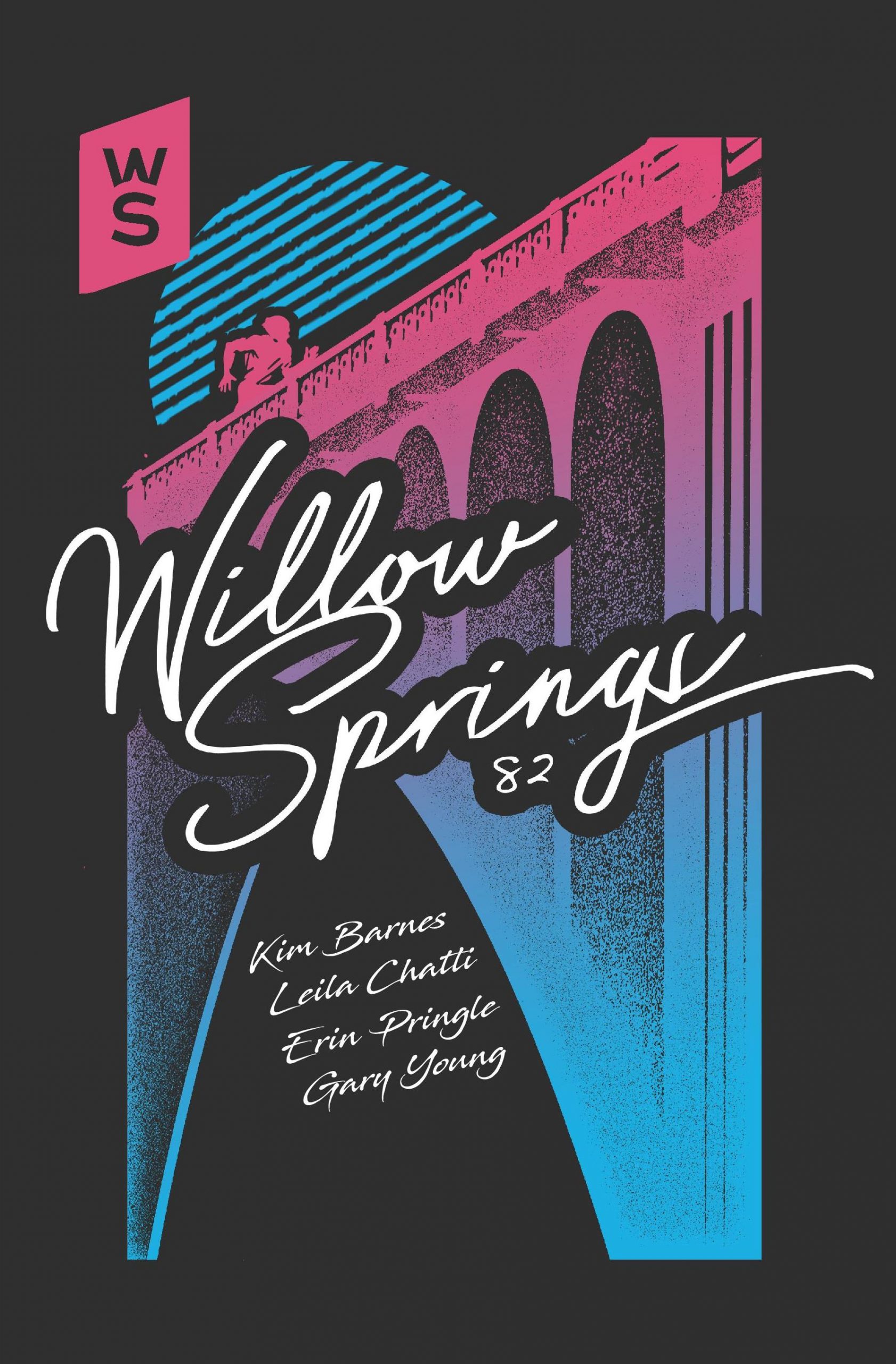
Found in Willow Springs 66
Back to Author Profile
What We're Sure Of
The day of Carol Covington’s departure from Whitman Elementary, we wait for our children in SUVs and sports crossovers, idling at the curb five minutes before the final bell. She emerges from the main entrance and walks along the chainlink fence to her Mazda convertible, clutching her long, tan, bohemian skirt in one hand and looking at the ground. We are not used to seeing her at this hour.
We usually see her in the early morning, directing crossing guards to their posts, when we drop our children at choir practice. Or in the parking lot long after school lets out, when we’re on our way to a hushed meeting with a secret vice: unfiltered cigarettes, key lime pie, men who wear jeans to work. Even at those hours, she smiles to herself, as if she has a secret that does not shame her. There are rare times we sign in at the main office to fetch a sick child away from the school nurse and see her up close: purple eye shadow, white plastic barrette holding her bangs back, the dime-sized tattoo of a butterfly on the inside of her wrist. She is our age – could easily have a third or fourth grader – but always seems younger, the way we might if we didn’t have children to tend and husbands to placate.
The day of Carol Covington’s departure, we crane our necks to watch her drive away. She doesn’t put the top down, though we’ve seen her zooming around town, her hair in the wind, on much cooler days. Even from our distance, we can see a repair the length of a forearm on the soft top. Our children scuttle from school, bags bouncing on their backs. Before our little monsters are even buckled in, we grill them: Why did Ms. Covington leave early today? Were there any announcements? They give brief, dismissive answers and we pull from the curb smoothly, as if everything is the same as the day before. But instead of a wave when we pass one another, we meet each other’s eyes and raise delicately arched eyebrows.
That evening we burn the garlic bread and cook the chicken breast until it’s dry. We forget to put detergent in the dishwasher and drift off as our husbands read us an article about the Middle East or the presidential primaries. That night, we cannot fall asleep and instead sit on our back decks, listening to the leaves of the giant oaks in the breeze. We comfort ourselves with memories of prettier, younger times. At the beach in a white string bikini. On roller skates at the rink when the announcer called “couples only” and a boy we didn’t know took our hand. Chewing tobacco with college guys at the construction site, cringing at the taste, the bitterness gentler in their kisses.
We think of Carol Covington’s face, like porcelain, with blue veins visible at her temple and the hollow of her cheeks. We think of the way her hand grasped her long, tan skirt as she walked to her car. We imagine underneath she wore something lacy and pink, the kind of think you need a little mad money and a lot of passion to wear.
The next morning we wake after our husbands have left for work, our children already eating cereal in front of the television. We flood the school’s office with calls to see if Carol Covington will pick up. Most of us get the automated answering system, but a lucky few connect with Principal Grove, who stammers on the line. Those of us who get through are quick with questions, voices clear and shrill. Principal Grove is evasive and, in at least one case, he hangs up.
At school, we barely notice our children as they climb out of the car. We are focused on the parking lot, scanning for Carol Covington’s convertible. It’s dreadful to admit, but many of us would not know what our children were wearing if they were – heaven forbid – to go missing. We would have to guess when the police asked, and then admit our negligence. “Carol Covington,” we’d say, crying in our palms. “If she’d been there, we’d know.”
Instead of racing to our hair appointment or a meeting with the contractor for our kitchen expansion, we shut off our ignitions and cluster in a group. We talk about the time we saw Carol Covington outside the school, in the baking aisle at Jewel, comparing two brands of unsweetened shaved coconut, earing yoga pants tight at the waist and flared at the calf. Or huffing her way around Lake Winnebar early in the morning in short shorts and ankle weights. Or outside the Rusty Saloon, waving off a man half her age as she climbed into her convertible, never mind that she talked him up inside through three Manhattans, tapping her gold ballerina flat against the foot railing at the bar.
Vicki Little thinks she may be on vacation. Mirabelle Weinraub insists she’s sick. “It could be bronchitis,” Jill Cane says. “With the change in the weather and all.”
Bianca Garret says, “She must live downtown, in one of those new loft condos.” We all go quiet, imagining her eating a microwave meal while looking out floor-to-ceiling windows. A view of the parking garage, but she doesn’t care because she’s on her way out to meet her friends at KissKiss, the new wine bar we’ve read about in the paper.
In the days that follow, we swap updates on the sidewalk after our children pack into school. Gail Lintel meets Carol Covington’s replacement, a round woman with freckles as dark as chocolate. Holly Regan heard she quit over a spat with Principal Grove. Winnie O’Connor knows Carol Covington’s cousin once removed and though the boy is vacant and always high, we believe what he says: that she is hard up for money. Who knows what job she might go to next? Perhaps tending bar downtown at one of the clubs with a cover charge, earing tight jeans and a shirt cut high to show her stomach. She’d lean over the bar to talk to men who smile at her, ask for her number.
We go home and paint our lips in bright reds, wear T-shirts pinched at the back with a clothespin. We look at ourselves in the mirror to see the shape of our breasts, the indentation of our navels, and imagine going to the hardware store or to buy liquor, men following us down aisles from which they need nothing.
One day while we’re clustered outside the school, Principal Grove peeks his head out the same door our children crowded into just fifteen minutes earlier and we stop speaking. He is a skinny man, with a bald spot as large as a teacup at the crown of his head. His chin is always coated in thick stubble. He wears the same clothing our husbands wear: a white button-down shirt tucked into black belted pants, a solid tie, keeps his body behind the large door, as if we might open fire, then ducks back in.
That afternoon, our children fist a memo that they throw into our laps. They turn on the radio and fill our cars with frenetic energy for what comes next – an after school snack, jittery minutes of homework at the table, hours outside on their bicycles or at the park.
We pick up this memo, read the snatches of it at stop signs. It is full of platitudes: Ms. Covington was dedicated to the school for eight years; she was well loved by the children. But in the days that follow, it will all come down to these two lines: “The administration and Ms. Covington have decided this is a good juncture for her departure. We wish her the best of luck in her endeavors.”
“It’s trying too hard,” Frieda Watts says the next morning outside the school. “We saw she wasn’t happy.”
Betty Horn drives around downtown hoping to spot her, but it is Kelly Sinclair who runs into her at the drugstore. She has toilet paper, maroon lip gloss, and Epsom salts in her basket. “Maybe tanning oil, too,” Kelly says in a whisper. She couldn’t quite tell, but it must have been, what with the translucent brown of the bottle. It is too dreary this time of the year for days at the beach and we picture Carol Covington in the tropics, stretched on her stomach in a yellow bikini. Maybe another tattoo at the small of her back – a bright orange koi, or a 1950s pinup girl perched on her knees. A piña colada within reach and a paperback in the sand, splayed open to mark her place. No need to raise her head and peer out to the water in search of a child’s familiar shape. “She didn’t want to talk,” Kelly tells us outside the school. “I asked her and she just shook her head and said, ‘On to new endeavors.’ Just like the memo.”
We decide this is coerced. We may not know the details, but we’re sure she’s been wronged. We imagine her in a failed affair with the principal, one that his delicate wind-up toy of a wife has discovered. The same sort of entanglements we’ve imagined with the young, goateed librarian who arranges the children’s summer reading program. Just a fling. But what does that matter when Principal Grove in unable to do anything but nod his head as his wife totters on tiny feet, raging?
It is nearly lunchtime when we split up and drive back to our houses. Chores go undone and aerobics classes are missed. We drink wine alone in our kitchens, looking out at manicured lawns. Or drive to the mall to browse for bright things – chunky necklaces in reds and blues, strappy sandals with rhinestones, glittery lip glosses that smell like cherry or bubblegum. We ignore the underwear our husbands need. We think we see Carol Covington bustling out of the salon or eating a boat of fries at the food court, but when we get closer, we realize it’s not her at all.
One morning, Holly Newfound comes up with her letter-writing campaign to reinstate Carol Covington. “If we’re supposed to write our congressmen, why not the principal?”
At dinner, we tell our husbands about this new development. They chew slowly, keep quiet, and look at us with attention.
In the days that follow, we meet to compose letters, read them aloud, cross out and rewrite. We do this over glasses of wine and tapas delivered hot from Moon, the trendy place where twenty-somethings go after eleven on weekends. In our letters, we praise Carol Covington’s gentleness, her diligence, her superior office skills. We don’t discuss that whimsical smile on her lips, or how she holds court at the Rusty Saloon, or the way she slides into that little torn-up Mazda as if it were a Lexus or a BMW. How the rips and dings don’t matter when she’s darting around our sluggish SUVs to meet friends for happy hour, late day sun flooding her two-seater. We don’t mention that we sometimes sit on our overstuffed couches during the day when we have nothing to do and listen to the breathing of our houses: the whoosh of the air conditioner, the churn of the dishwasher, water running through pipes.
After several days, we sign our names in the blue ink. Someone has written a letter to the school board and one to the superintendent. If Principal Grove won’t reinstate her, maybe those above will.
After the letters are sent, we become restless. Some of us venture to the Rusty Saloon under the pretense of looking for Carol Covington. We imagine striking up a friendship over cocktails, maybe even exchanging phone numbers. But we dress in pencil skirts, folded over the top so the hemline is shortened, and sleeveless blouses cut at the neck in a V. We forsake nylons and bras, our breasts loose on our tops, the thin silk showing the swell of our nipples.
We want to be brazen at the bar, flirt with the workmen who come in after six, but we sit primly sipping drinks that are strong enough to make us shudder. When a man does approach, we soften our shoulders, smile in a way that feels young and uncomfortable. We find ourselves breathing fast, and this makes the men move closer. Some of us flee to the cool comfort of our cars, the smell of orange juice and school glue. Others drink more, until the bartender says, almost offhand, “It’s getting late, don’t you think?” as if he knows we are playing dress up. Lois Rosenbaum stays even past this point and ends up calling her husband from the bathroom, crying into her BlackBerry, begging for forgiveness, though she’s learned to play pool from a six-and-a-half-foot crew worker who laid his hands – stained black from asphalt or tar – on her waist.
At home, we shed khaki slacks and silk blouses for jeans and fitted T-shirts. We go the whole day without makeup, without even foundation. Our weekly maids pick up more clothes and toys, load more dishes into the washer, wipe more rings from the glass coffee table. They are unable to get to the second floor with all the work we’ve left for them on the first. Our children winnow down their homework time to twenty minutes and find we do not protest. They ride their bikes across busy Heights Road to go to the park in the afternoon instead of waiting for us to drive them. Our husbands complain amount of takeout we eat, but not so voraciously that evenings are spent in a spat.
We take long drives after the children have settled in their rooms, slipping out when our husbands tuck into the recliner to watch the news. We drive back roads that we usually avoid and think about who we wanted to be at sixteen: a researcher at the polar cap, a dancer in Vegas, an archeologist flying off to digs in Morocco or India. We think about the way even the smallest choice could have resulted in something very different.
Two weeks after our letters are sent, we receive a response from the school. It is a form letter, addressed to “Concerned Parents,” and announces an open meeting to discuss Carol Covington’s departure from Whitman Elementary. When we pick up our children that day, we are already playing the music loud. We smile as they get in, and together we scream the lyrics we know on the drive home. We joke with them during homework time, and it lasts longer than normal but they get less done. They kiss us on the cheek when they leave to play basketball or rollerblade on the front walk.
When our husbands return home, a hot meal of stew or brisket is waiting. We wear pressed pants, our hair carefully brushed and curled. They are grateful for this normalcy, but don’t say anything. In bed, we cup their bodies with our own, maybe even make love. We imagine ourselves like Carol Covington, choosing who we sleep with and when, not feeling guilty when we simply wave them away,
They day of the meeting with Principal Grove is unusually windy. Garbage cans are tipped over; fast food wrappers scurry across lawns. Young trees with thin trunks sway. We touch up our lipstick as we drive, glance at our cell phones through they haven’t chirped. At the school, we park in the lot, like proper guests instead of parents depositing and collecting children. We jog to the building as our hair is whipped round our heads, the tails of our shirts pulled up from our tailored pants.
We meet in Principal Grove’s office, as if he knew the only people in attendance would be those of us gathered outside the school. We are put off by this presumption, but knew it ourselves. Carol Covington’s replacement smiles as we enter. She is as dowdy and unsure as Gail Lintel described her and we giver her only perfunctory nods. Lois Rosenbaum shakes her hand, out of sympathy or politeness, we don’t know. She’s been less resolute since her drunken, weepy call from the Rusty Saloon.
There are only two seats in Principal Grove’s office besides the one he occupies behind his desk. We crowd in. On his desk is a cluster of silver frames, their backs to us, and we imagine his wife’s pinched face sourpussing out at him. He clears his throat. We feel strong taking up so much space in this man’s office.
We imagine Carol Covington, in her loft condo, shades drawn, sleeping lat after a night out. She’ll wake for yoga at Bliss later in the day. We imagine her legs crossed on a pink mat, her thin arms reaching up, fingers in a delicate curl. She’s been out of work nearly a month but this is not yet cause for concern. There’s a small cushion of cash, few bills, no one else to worry about.
“You’ve caused quite a stir,” Principal Grove begins. “So much so I’m having to make explanations to the administration that Ms. Covington herself would have wished to remain unexplained.”
“Really?” Kelly Sinclair says, and we chuckle. The principal is reprimanding us, but we are familiar with this tactic. Our very own husbands employ it when playing to our sympathies. When we were told our collie had to be put down because she was in pain from her hip dysplasia. Or that our children needed to learn independence when they wept at preschool, yelling for us as we walked away.
“Based on your assumptions,” he says, “I imagine you don’t know why Ms. Covington decided to leave.”
The thick smell of cloying flowers and citrus fruit is like a plume above our heads. “Are we to understand,” Kelly Sinclair says, “that Ms. Covington left of her own accord, when the memo clearly stated it was a decision made by the administration, too?”
The principal sighs, picks up a pen with flashy silver accoutrements, and taps it against his desk calendar. “It’s not what you think.”
The room feels electric, as frantic and hesitant as when a stunt performer is about to do a particularly dangerous feat and you think you may witness something devastating.
“She’s tending to family,” he finally says.
We shuffle and muffle coughs behind our hands. Jeannie Hill turns to Principal Grove and says, “A sick child? Father with Alzheimer’s?” We think of stories we’ve seen on television news magazines, of families upended by bad luck.
Principal Grove shakes his head, looks down to his desk. “If I may make a suggestion.” His voice is tender and some of us think of the affair we suspected, that it might not be that far-fetched. “You might put your energy into raising funds for Ms. Covington and her family. The bills are more than they can bear.”
We stand in silence for half a minute, waiting for someone to speak. Our eyes dart to one another, taking in freckles on our bare shoulder, or a bra strap slipped out from under a loose collar. The office door opens slowly, and Harriet Loomis and Ingrid Setterman have to squish back in order to let it arc open. The round woman cranes her neck in to say, “It’s eleven.”
He’d scheduled us very close to his next obligation.
Betty Horn is the first to leave and we file out behind her. Outside, most of us keep our heads bowed to shield our eyes from the wind. Later, some of us claim Carol Covington pulled into the lot at that very moment. Maybe to pick up her last paycheck. Or a few personal items she left behind. We envision this: Carol Covington in fitted denim overalls and a yellow rubber bracelet ringed around her wrist – the kind people once wore for solidarity against diseases but now wear for sports teams and reminders to “Achieve” or “Love.” We expect her to seem familiar, like a friend from high school, or our children’s teacher from last year. But this woman is smaller than we expect ad reminds us of the ladies selling makeup at the Lancome counter at the mall. Someone waves, probably Lois Rosenbaum – she would do that kind of thing – but Carol Covington does not see this. We imagine turning out of the parking lot before she’s even made it to the school, and seeing her in our rearview or side mirrors. At the end of the street we turn and stream onto Heights Road, the one our children are not supposed to cross alone.
Later that day, we return to pick up our children. We wait in our cars at the curb and they run to us, smiling. We let them skip their homework, and send them out to ride their bikes or climb trees. We consider calling one another, but don’t. We cannot stand the bright colors on our walls or the smooth, polished wood floors, everything in its proper place, se we venture to the garage or the back shed. There, with the low fumes of oil and gasoline, we lean against the wall and think of Carol Covington in a small house at the edge of town, the side that borders the rougher Mills, no the upscale Lakewood. We see her in the kitchen, with mustard-yellow floor tiles and appliances from the eighties, preparing soup. She opens the hollow door to her daughter’s room and the girl is in a wheelchair, or confined to bed, her legs and lungs too weak to support her. Or perhaps it’s her husband. Bald from chemo, retching over the side of his bed. We imagine Carol Covington leaning over this person, and we are not able to get this image out of our minds.
While dinner cooks, we jot down fundraising ideas – the children selling candy door to doo, or free-throw contest, or dance-a-thon – but know we will never organize them. When our husbands come home, we don’t mention what’s happened.
Though we don’t speak of Carol Covington when we sit at the bake sale tables, or when we gather to cheer our children during Elementary Olympics, or watch that year’s play, On the Oregon Trail, she is still with us. Nights when we cannot sleep, we imagine her as we used to: alone in her loft condo, her bare feet propped on an ottoman, eating potato chips and drinking a watermelon martini. Tomorrow, she will leave for the weekend trip, somewhere loud and bright, the kind of place she can wear skintight pants, gamble, and yell above the thumping music with her cluster of friends. But tonight she stands in front of the mirror, piling her hair atop her head to decide if she wants to wear it up when she goes out this evening. On the other side of her door is a man – a boy really – in low-slung jeans with messy hair that covers his right eye. We turn over in our own beds and hold the image of Carol Covington at the Rusty Saloon, lipsticked and curled, wearing gold ballet flats. The boy who is not her husband, who she owes no obligation to, is about to knock, and Carol Covington lets her hair fall, lips parted in a laugh – the distance between her face and the mirror is so insignificant, she could reach out and touch her reflection.








